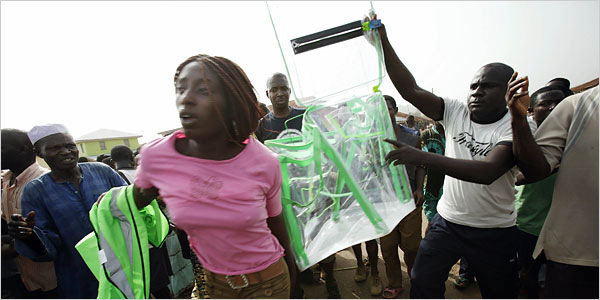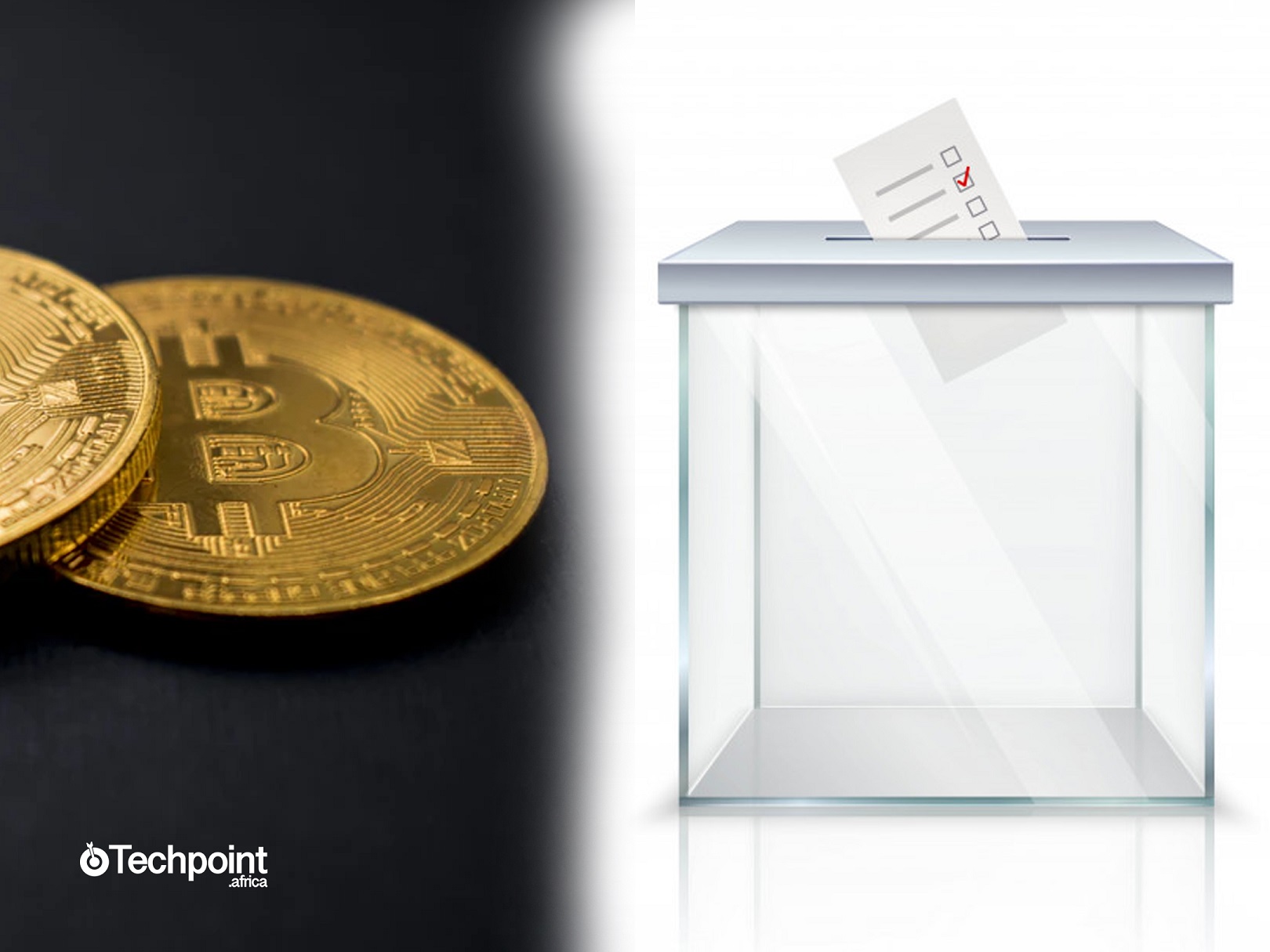Elections are perhaps the core of democracy, a process where people have a say in who leads and how they are led. It’s the point where citizens exercise their power.
In Nigeria, however, rather than exercise their power during the democratic process, Nigerians have to exhibit courage and bravery. The annulled presidential election of June 12, 1993, is widely regarded as a constant reminder of how democratic power was, and perhaps still is, stripped from the people.
For Jerry Ojumah, a blockchain developer and designer, election season in Nigeria is a time of anxiety; the focus is on surviving the process and not on the election outcome.
“How can performing your civic right be an endangerment to your life?”
This was a recurring question as Ojumah narrated how he lost his friend, a National Youth Service Corps (NYSC) member, during the 2011 Nigerian presidential election.
The country’s 2019 general election claimed 626 lives, according to a Premium Times report.
Given the violence and conflict that characterise Nigerian elections, questioning election results isn’t out of place. Unfortunately, election violence isn’t the only problem plaguing Nigeria’s democracy.
According to a report by the Law Library of Congress Global Research Center, the 2007 elections observed by the National Democratic Institute reported an obscene amount of irregularities such as underage voting, ballots without names of some candidates, errors in voter registration, and inadequate polling stations.
The report also highlighted the observations of the European Union Election Observation Mission (EU EOM), which found out that the election did not meet basic regional and international standards.
It cited lack of organisation, absence of basic transparency, “widespread procedural irregularities and significant evidence of fraud.”
To bring transparency and safety back to elections, perhaps a technological intervention, a process that is immutable and free of external influence, should be considered.
Blockchain technology is often tied to the flagship cryptocurrency — Bitcoin. But in truth, cryptocurrencies are only an application of blockchain.
Blockchain is to Bitcoin what the Internet is to email. It is just the technology upon which cryptocurrencies work.
Also known as distributed ledger technology (DLT), blockchain has been considered an answer to election problems.
In a Forbes article, Frank Palermo advocated blockchain voting in the US after an alleged hack of the current voting system in 2016. He says with blockchain, hackers will need to do the impossible — hack through a network of computers.
From ballot paper to blockchain ledger

Blockchain has been used for elections in some countries, but the technology is very far from mainstream adoption.
Per tech publication Hacker Noon, blockchain was used for voting in Sierra Leone, Japan, and Russia.
In Sierra Leone, the exercise was controversial as it turns out the blockchain company contracted for the job might not have used blockchain at all.
The tech was also introduced in Tsukuba City, Japan. However, it has only been used to vote for social development proposals.
It was in the US, however, that the use of blockchain began to look like a real replacement for the current system of elections.
In May 2018, according to NBC News, West Virginians living abroad were able to send their votes in for a primary election with a blockchain voting system. The news says it was a success as over 140 people voted.
Blockchain is a relatively new technology. This raises the question of how people who are not familiar with the technology will use it during the elections.
i-Elect is a blockchain voting platform with a use case in Nigeria created by blockchain developer and designer Jerry Ojumah. It was made for the Covenant University Alumni Association (CUALA) election.
According to Ojumah, the platform will be easier to access than traditional voting methods, with people voting from the comfort of their homes.
Voters can access the platform with a computer or Internet-enabled mobile device. All they have to do is click on their preferred candidate, and the information goes into the blockchain network.
Interestingly, Ojumah adds that blockchain-powered voting will reduce the cost of running elections tremendously. The Guardian reports that ₦245 billion was budgeted for elections in 2019.
A large portion of the budget went to logistics and security. Ojumah believes that without the need for logistics and security costs, less than a fraction of that budget would be required to conduct a blockchain-powered election.
Nevertheless, usability and scalability remain crucial considerations. Ojumah’s response to this is; a simple user interface, available in most Nigerian languages combined with text to speech features for those who cannot read or are visually impaired.
“Thanks to new generation blockchain networks, the platform will be able to process large amounts of data simultaneously,” Ojumah says.
In cases of poor Internet coverage or lack of smartphones, Ojumah submits that Unstructured Supplementary Service Data (USSD) can be integrated.
Can it work in Nigeria’s political space?

Segun Amure, a one-time aspirant for councilorship in one of the local governments in Osun State, believes that the government should consider anything that will keep elections free and fair.
“If blockchain technology can guarantee ease of voting in elections, the safety and will of the people I think is good,” Amure says.
Orowale Triumph, a young politician with dreams of one day becoming president, says, “It sounds like a process that is not faulted by humans; the creator of the platform or the government cannot influence the data. I think the credibility and transparency of the technology can be vouched for, so why not?”
Though Triumph is sure that blockchain will change Nigeria’s current political climate, he doesn’t think Nigerian politicians will adopt such technology.
“The entire system needs a change…most politicians will stop at nothing to make sure elections go their way. In such a political situation, they will not succumb to a technology that assures free and fair elections.”
Clamouring for electoral reform, Triumph says, “The power again lies with the masses. If they push for the electoral reform act, then there is a possibility that such a technology will be adopted to foster free and fair elections.”
Arguments against blockchain elections
A report by the Massachusetts Institute of Technology (MIT), published November 2020, sees blockchain elections as a threat to democracy.
Claiming that online voting would increase cybersecurity concerns, the MIT says “Voatz” — the platform used for elections in the 2018 West Virginia in the US — suffers from security vulnerabilities.
It also says the growing proposals for blockchain elections is borne out of the enthusiasm to improve and modernise elections.
The report also cites crypto investors’ losses over the years as a reason to distrust blockchain.
According to the report, voter verifiability and contestability are some problems blockchain cannot solve. It, therefore, called for a return to the paper balloting system as it is safer than online voting.
Considering that money can be stolen online and physically, MIT’s report somewhat strangely predicts that the vulnerabilities associated with online shopping and banking will affect voting with blockchain.
Could these positions and submissions result from a misunderstanding of how a blockchain-powered election works?
How a blockchain powered-election works
Adedayo Adebajo is the Managing Director of Jelurida Africa, the African arm of Jelurida, the Swiss company behind the creation of Ardor, a blockchain network with smart contracts capability.
According to Adebajo, creating a poll on the Ardor network requires all voters to have a funded Ardor account. This new generation of blockchain gives the option of KYC for users. So, various conditions can be set before a person is allowed to vote. However, voting is not free.
“Every single vote is a transaction,” he says.
A transaction needs to be made to vote, and a voter needs at least one Ignis — a child chain of Ardor and a cryptocurrency — to vote.
Alternatively, the creator of the polls could pay for everyone’s vote. This means that if the federal government creates polls on the Ignis network, they could pay for everyone to vote.
Responding to whether Jelurida will make money if Nigeria holds elections on its platform, Adebajo says, “We can not really say they make profit from this because it is still made free and the amount paid is merely for usability purposes.”
At the time of writing this piece, one Ignis was approximately 30 cents. Voting for a population of say 150 million people will cost approximately $45 million, which translates to ₦21.5 billion — a fraction of the ₦245 billion budgeted for the 2019 election.
When it comes to the safety of this data, he reveals that in a scenario where 51% of the nodes running Ardor suffer an attack, data could be compromised.
However, there are 2,000 Ardor nodes spread across different parts of the world, making the possibility of an attack very slim.
As a Nigerian, Adebajo feels Nigeria should adopt blockchain voting but he believes it will not happen anytime soon because “there are a lot of people who benefit from the lack of transparency and lack of digital trails” in elections.
Adebajo suggests that a way to adopt this system of voting is to start small. From voting within associations to voting in local government elections before getting to the national level.
For Nigerians, adopting a technological solution to solve election problems transcends a desire for ease and convenience during voting. It is perhaps the only alternative to reviving a dying democracy.
News reports give statistics of lives lost during elections in Nigeria; the pain, however, is inestimable.










